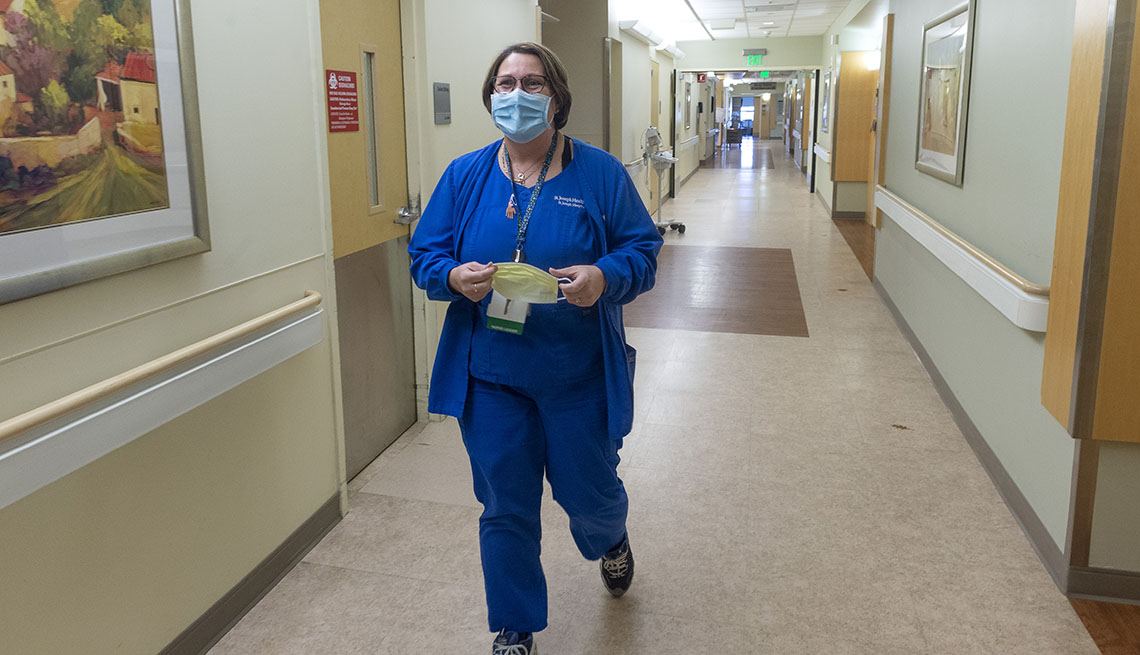Play all audios:
"What I want people to know is that it broke, and still breaks, our heart that you couldn't be there with your loved one. It really, really hurt us,” Little emphasizes. “We knew we
couldn't provide that same level of comfort to patients without their family.” Little's voice catches as she describes one scene that often replays in her mind: “When one
gentleman was dying, we had 20 of his family members on Zoom. A nurse and a nurse in training were there, holding his hands, as his family sang him to heaven.” THEY GRIEVE FOR THE PATIENTS
THEY LOST Although every loss was difficult, nurses have certain patients they carry close to their hearts: the husband and wife married 43 years who died on the same day, pregnant women who
miscarried, young people driven to suicide during a time of social isolation. Many nurses also lost hospital colleagues and friends to COVID-19. Because of hospital visitation restrictions,
nurses developed closer-than-normal relationships with many COVID-19 patients, Adamson says, which made losing them that much harder. "Before they were intubated, you got to know them;
you talked to them because they had nobody else. A lot of times with COVID, they would die really suddenly. It was just … hard,” Adamson says, haltingly. “I still have moments when I break
down.” AFTER FEELING UNPROTECTED, DEEP CONCERNS LINGER Some nurses say they felt abandoned by hospital administrators and the government's inability to get them the protection, staffing
and public support they needed. Although they were hailed as heroes, nurses in some cities had to write letters and hold protests demanding adequate supplies, including PPE, and many health
care workers died without it. “The hospitals were not protecting us,” Adamson says. “I hope that [the pandemic] exposes some of the real problems in the for-profit health care system."
Others say they find it discouraging when people refuse to wear masks or take the pandemic seriously. “Here you are working very hard in the hospital to save lives, and then you go out in
public and you see people not taking precautions,” says Dan Lovinaria, 55, a certified nurse anesthetist at the Minneapolis Veterans Affairs Health Care System. “It was incredibly
frustrating.” Thigpen adds: “What we heard so many times is, ‘It's not real. You guys are making this up.’ … And then it lands on top of your family and you believe it.” YOU CAN SUPPORT
THEM BY GETTING VACCINATED Nurses say the coronavirus crisis taught them how strong they could be, how to work together more efficiently and how to quickly adapt to changing circumstances.
“Our staff has learned an unbelievable new level of teamwork,” Correll-Yoder observes. “This has really bonded them in a completely different way.” As the pandemic wanes, nurses are taking
the time to do things they have put off. Little held her grandchildren for the first time in eight months. Sienkiewicz and her husband bought the second home they've always wanted.
Lovinaria, after seeing how hard COVID-19 hit patients with obesity, high blood pressure and other underlying conditions, has been taking better care of himself and is going to the gym five
days a week. "We are always putting things off and saying, ‘I'll do it another time,’ “ Sienkiewicz says. “[The pandemic] opened our eyes to say, There's no time like the
present.” Nurses agree that the biggest silver lining of all was the rapid development of safe and effective COVID-19 vaccines. When the first doses came down the hall of Little's
hospital, she says everyone “was standing in the hall cheering and clapping.” The best way the public can support nurses right now is to get one of those vaccines, nurses say. “Please, go
and get vaccinated,” Correll-Yoder stresses. “We don't want to do this again. We don't want more people to die.” Michelle Crouch is a contributing writer who has covered health and
personal finance for some of the nation's top consumer publications. Her work has appeared in _Reader's Digest_, _Real Simple, Prevention, The Washington Post_ and _The New York
Times_.

